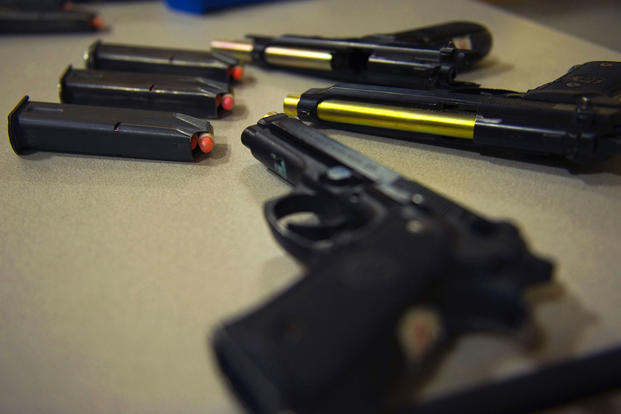The Pentagon's new policy for carrying firearms on base is intended for uniformed service members and civilians working for the U.S. military -- not for retirees, Defense Department officials maintain.
"Arming and the Use of Force," a Nov. 18 Department of Defense Directive approved by Deputy Secretary of Defense Robert Work, provides detailed guidance to the services for permitting soldiers, sailors, airmen, Marines and Coast Guard personnel to carry privately owned firearms on DoD property, according to the document.
In response to its Nov. 21 story, Military.com has received numerous emails from retired service members, asking if the directive will allow them to carry their firearms on base.
The directive is a broad DoD policy that each of the service chiefs will enforce as they see fit, according to Pentagon spokesman Maj. Jamie Davis.
The policy, however, does not apply to retirees, he said.
"This policy only covers active service members, DoD civilian employees, and DoD contractors -- when applicable," Davis said. "Guidance for retirees, dependents and other members of the public will be addressed in a separate instruction at a later date."
Commanders, O-5 and above, "may grant permission to DoD personnel requesting to carry a privately owned firearm (concealed or open carry) on DoD property for a personal protection purpose not related to performance of an official duty or status," the document states.
Applicants should be 21 years of age or older, the age many states require an individual to be to own a firearm, according to the document. Proof of compliance may include a concealed handgun license that is valid under federal, state, local or host-nation law where the DoD property is located.
"Written permission will be valid for 90 days or as long as the DoD Component deems appropriate and will include information necessary to facilitate the carrying of the firearm on DoD property consistent with safety and security, such as the individual's name, duration of the permission to carry, type of firearm, etc.," according to the document.
Until now, DoD personnel have not been authorized to carry personal firearms on military installations, a policy that came under scrutiny in the wake of "active-shooter" attacks at U.S. military bases that have resulted in the deaths of service members.
It will be up to each service to "go through and fine-tune it to suit that service's needs," Davis said. "It could be very restrictive based on the leadership of that service. It really boils down to how the services want to implement this."
Army Chief of Staff Gen. Mark Milley has argued against reversing the DoD policy that prohibits service members from carrying concealed weapons on post.
Testifying at an April 14 congressional hearing, Milley cited the Nov. 5, 2009, mass shooting at Fort Hood, Texas, in which 13 people were killed and 42 others injured. The day of the shooting, Nidal Hasan, then an Army major and psychiatrist, entered the Fort Hood deployment center carrying two pistols, jumped on a desk, shouted "Allahu Akbar!" -- Arabic for "God is great" -- and then opened fire.
Milley defended the short time it took for law enforcement there to secure the scene and said he is not convinced that allowing soldiers to carry privately owned weapons would have stopped Hasan.
Military.com reached out to Milley's office for comment on the story, but his spokeswoman, Lt. Col. Cathy Wilkinson, said the chief's office was unable to provide a comment by press time.
The directive also advises that personnel authorized to carry privately owned firearms must "acknowledge they may be personally liable for the injuries, death, and property damage proximately caused by negligence in connection with the possession or use of privately owned firearms that are not within the scope of their federal employment," according to the document.
-- Matthew Cox can be reached at matthew.cox@military.com.






























